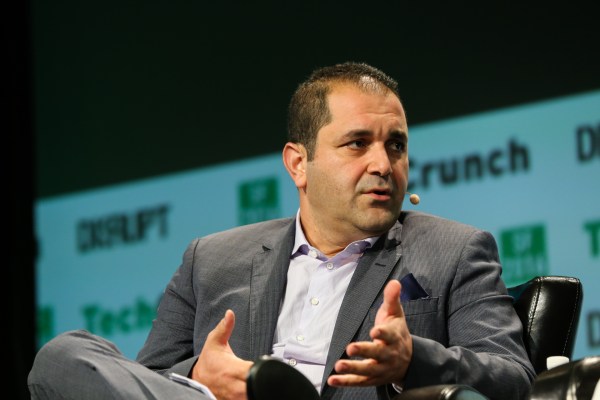Shervin Pishevar, well-known venture capitalist and co-founder in the two-year-old L.A.-based futuristic transportation company Hyperloop One came to TechCrunch Disrupt today to chat about shooting across the world people and things — faster than the speed of sound.
But just how soon will we see that happen? Pishevar says his team is “full steam ahead” to get us there by 2021 and that the first one will likely be overseas.
Plans to build the Hyperloop came from a conversation Pishevar had with his friend and founder of Tesla and SpaceX Elon Musk while on a trip to Cuba. It has since raised roughly $130 million in the first 18 months of operation, according to Pishevar.
The company announced an additional $80 million in funding earlier this year, adding up to just over $92 million, according to Crunchbase. A Hyperloop spokesperson clarified the company has raised north of $100 million thus far. It will likely need hundreds of millions more to continue the race.
But we are getting closer to hopping aboard, according to Pishevar. The company recently broke ground in Nevada for a new manufacturing plant and conducted testing of its propulsion technology earlier this spring, yielding a pace of 110 mph in 1.7 seconds — a fraction of the proposed 700 mph speeds.
But, says Pishevar, that initial test was on a very short track and the tech is expected to speed up with longer distances.
The company is busy gearing up for its “Kitty Hawk moment” next year when it begins testing on its passive levitation system.
Hyperloop One has also made inroads to building its tech across the globe, partnering with several cargo ports, including in Russia, Finland and a recent announcement with DPWorld in Dubai.
“The world economy is growing so fast. The ports are stressed. The real estate is expensive,” Pishevar said. The idea is to move ports to offshore places like the desert, thus opening up billions of dollars of waterfront property.
Pishevar, also an Uber investor, thinks the idea makes a new kind of futuristic city possible, too.
“You could Uber within the city and Hyperloop to other cities so you could go from New York to DC in 30 minutes,” he said.
Though the company seems to be motoring right along with its plans, it’s not without its challenges. There’s another competitor in the space for one. Hyperloop Transportation Technologies, is also based in L.A., also plans to build worldwide and says it is working with governments around the world to do so. And both companies face building challenges and regulatory issues to get from point A to B.
Hyperloop One is also in the midst of a lawsuit with former co-founder Brogan BamBrogan and had a leadership shakeup. Pishevar did not want to talk about the legal woes, but did say he doesn’t spend his time thinking about the competition.
“The thing I learned from Travis Kalanick, Elon and others is they don’t spend their time thinking about competition. They think about what they’re going to build next,” he said. “We’re not thinking about the past, we’re full steam ahead on the future.”
What’s in the nearest future for the young transportation company involves lots of testing and working with governments to get it to the next phase.
“Hyperloop is a decades-long effort. You’re moving steel and reshaping physical things so you need government to help you build,” Pishevar said.
